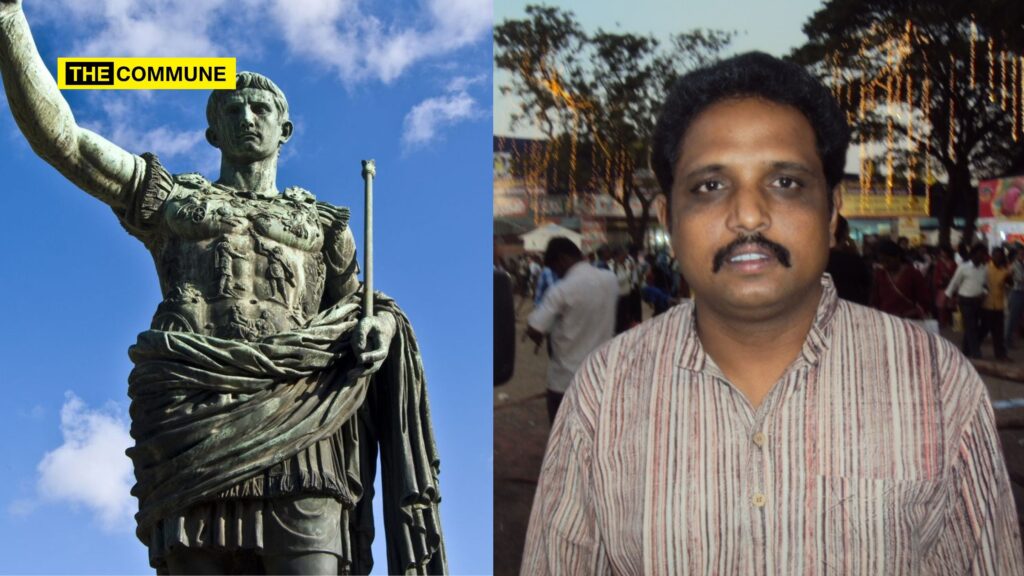Communist MP Su Venkatesan is once again in the news – this time it is for his “history” lessons about Roman King Julius Caesar, or was he a Greek King, according to the Communist history?
In an event held a few days ago, he is seen speaking about the greatness of the city of Madurai. In the speech, he touches upon Rakhigarhi and its findings, Keeladi, and talks about how historically important the city is. Suddenly, he touches upon something very interesting.
He says, “Construction of the present Madura Coats Mill began in 1899. When digging the ground to build the foundation, they found old coins. Upon investigation, it was found that those coins featured Julius Caesar who ruled Greece 2200 years ago. In 1932, the American Missionary wrote and published a book on the discovery of the coins. American Madura Mission was an important Mission – Pasumalai School, and American College, were founded by the missionaries. I found that book which I had been looking for a very long time at a shop near the Regal Theatre. In the book, a father had written, that coins were found when they were digging the ground to build Madura Coats Mill. Those coins were those of Julius Caesar. These coins must be kept safe, so we gave them to the American College for safekeeping.” Julius Caesar ruled 2400 years ago and the coin he used during his reign was exchanged with a trader living on the banks of the Vaigai River for some trade.”
Many netizens on social media called out his ignorance of world history since the Communist leader himself has written books on historical topics like the Indus Valley Civilization, Vaigai River Civilization, etc.
Julius Caesar was a Greek king from 2200 years ago. Communist history lessons from the Madurai MP. pic.twitter.com/2DvRA93RaF
— Vijaykumar Shanmugam kaadaiyon (@vijayshan) October 23, 2024
While his pronunciation may be defective (he seems to say Majura Coats instead of Madura Coats), in reality, in 1889, Madura Mills Co. Ltd., also known as Madura Coats, was established by Scottish brothers Andrew and Frank Harvey who were involved in cotton trading.
Who Was Julius Caesar?
Wikipedia says Gaius Julius Caesar (12 July 100 BC – 15 March 44 BC) was a prominent Roman general and statesman. As a key member of the First Triumvirate, he commanded Roman forces during the Gallic Wars and later triumphed over his political rival Pompey in a civil war. This victory paved the way for him to assume the role of dictator from 49 BC until his assassination in 44 BC. Caesar’s actions were pivotal in the fall of the Roman Republic and the eventual emergence of the Roman Empire. Although he was Roman, Caesar could speak Greek.
Did Julius Caesar Rule Greece?
However, Caesar did not rule Greece. The Battle of Pharsalus is said to have taken place in 48 BC in Greece. The battle was primarily between two factions of Romans: Julius Caesar’s army and Pompey the Great’s forces. Both armies consisted mainly of Roman soldiers, with some foreign auxiliaries from regions supporting Caesar or Pompey. That is the closest Caesar gets to Greece.
The definitive Roman occupation of the Greek world was solidified after the Battle of Actium in 31 BC, where Augustus defeated Cleopatra VII, the last Greek Ptolemaic queen of Egypt, and the Roman general Mark Antony. Following this victory, Augustus conquered Alexandria in 30 BC, marking the end of Hellenistic Egypt as a significant power. The Roman era in Greek history continued with Emperor Constantine the Great, who established Byzantium as Nova Roma, the new capital of the Roman Empire, in 330 AD. This city was later renamed Constantinople.
Roman Coins In Madurai
In 2023, excavations in Keeladi, Tamil Nadu, uncovered significant Roman artifacts, including silver coins attributed to Augustus Caesar, indicating possible trade links between ancient Rome and this region during the Sangam age. The Archaeological Survey of India (ASI) reports that findings from the site date back to as early as the 8th century BCE, revealing brick structures, decorative jars, and various antiquities. These discoveries challenge previous assumptions about urbanization in Tamil Nadu, showcasing Keeladi as a vital urban center and opening avenues for further archaeological investigations across South India.
Dr Nagaswamy’s book “Tamil Coins” also mentions coins being found in 1882. It says, “We have seen that Roman coins (Honorius and Arcadius) were found in the city of Madurai in 1882. That Roman coins were in circulation even after 5th century is thus attested.”
Ancient Roman coins have been unearthed in the coastal town of Arikamedu, Tamil Nadu. Archaeologists discovered a 2,100-year-old Roman coin alongside five others that date back 1,700 years, along with various artifacts, providing evidence of trade conducted by the Romans in the region. Between 1899 and 1904, excavators uncovered numerous artifacts, including burial urns and skeletal remains, while iron and bronze objects were particularly notable for their craftsmanship.
The findings of Roman coins and artifacts in South India, particularly in the Coimbatore and Madurai districts, indicate a significant trade relationship with Rome during the Imperial age, especially from Augustus to Nero. During this period, Roman demand for Indian goods such as spices, perfumes, ivory, fine muslins, precious stones, and cotton surged. The most notable export was the beryl, sourced from specific locations in the Coimbatore District, believed to be the purest in the world.

